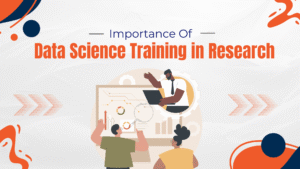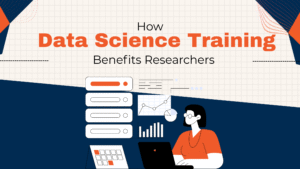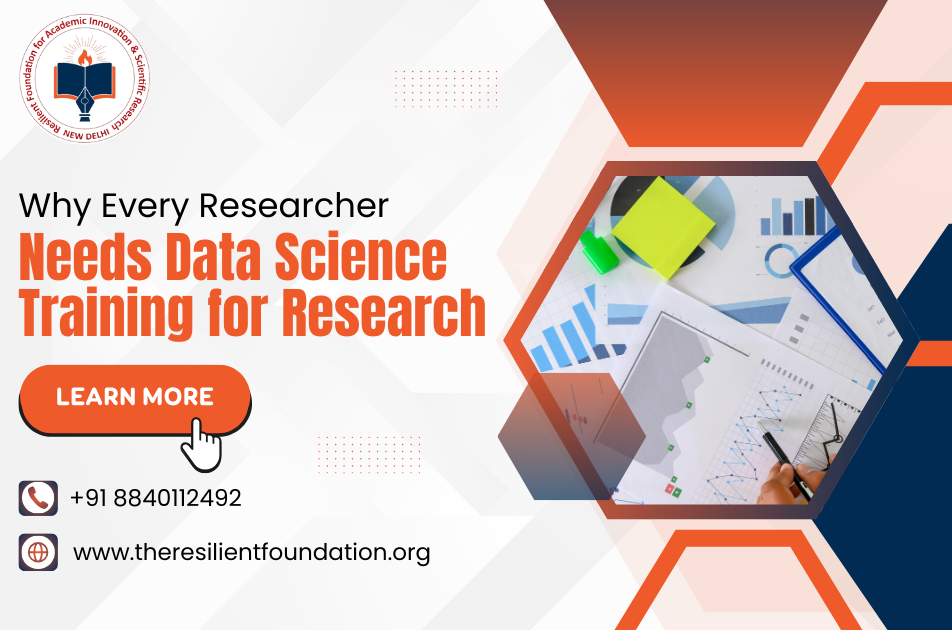In today’s world, research is no longer limited to books, surveys, or traditional methods. Every field now generates massive amounts of data, and making sense of it requires more than just observation. That is why data science training for research is becoming essential. Researchers from social sciences, healthcare, technology, and education can no longer rely only on manual methods. With the right skills, they can analyze data faster, interpret results with confidence, and present findings in ways that truly make an impact.
Importance of Data Science Training in Research

Research without proper data handling often leads to gaps in understanding. However, training provides a structured way to work with data effectively. The following points highlight why it matters:
- Better Accuracy: Through a data science certification, researchers can reduce errors in their studies and validate results more effectively.
- Time Efficiency: Automated tools allow faster research data analysis, saving valuable time during large projects.
- Smarter Decisions: Training helps learners apply evidence-based methods rather than relying only on assumptions.
- Broader Opportunities: Many funding agencies and universities now encourage participation in data science workshops for researchers to improve research quality.
Because of these advantages, learning data science is no longer optional. It is becoming a must-have skill for anyone serious about research.
How Data Science Training Benefits Researchers

Learning data science is not just about coding or technical skills. It creates long-term benefits that directly influence a researcher’s work. Some of the key benefits include:
- Clearer Insights: With data visualisation, complex data can be presented in easy-to-understand formats that make findings more persuasive.
- Cross-Disciplinary Use: Whether in medical studies, social research, or engineering, the use of best data visualization tools allows researchers to share results effectively with diverse audiences.
- Career Growth: Completing a data science certification makes researchers more competitive in the academic and professional job market.
- Innovation: When researchers learn advanced techniques, they can bring fresh approaches to solving old problems.
Therefore, training is not just about skill-building—it’s about shaping the future of research.
Key Skills from Data Science Training for Research
When a researcher takes formal training, they acquire skills that can be used throughout their career. Some of the most valuable skills include:
- Data Cleaning and Preparation: Many research projects fail because the raw information is unorganized. Training in research data analysis helps remove irrelevant data and prepare it for study.
- Visualization Skills: Knowing how to use the best data visualization tools allows researchers to transform raw data into interactive charts and meaningful graphics.
- Machine Learning Basics: Researchers can learn how algorithms support predictions and help create deeper insights from studies.
- Interpretation and Reporting: With the right knowledge, researchers can confidently use data visualisation to present results in reports, journals, and presentations.
Because of that, researchers don’t just collect information; they also learn how to communicate it in ways that matter.
Dos and Don’ts of Using Data Science in Research
Like any field, applying data science in research comes with some best practices. If researchers follow the right steps, they can achieve great results, but if they ignore them, they may create mistakes.
Dos
- Always take part in data science workshops for researchers to keep skills updated.
- Use data science training for research to integrate ethical and accurate methods into your study.
Don’ts
- Don’t rely on tools alone without understanding the basics of research data analysis.
- Don’t ignore data visualisation because presentation is as important as data collection.
So, if you want your work to have a long-lasting impact, following these practices can make a big difference.
Why Data Science Training is Becoming Essential for Researchers
In recent years, the gap between traditional methods and modern approaches has grown wider. Researchers who do not upgrade their skills are often left behind. That is why training is becoming more of a necessity.
- Global Standards: Most top institutions now expect researchers to complete a data science certification as part of their professional journey.
- Funding and Recognition: Agencies often support projects where proper data visualisation and reliable analysis are included.
- Practical Application: From policy-making to healthcare solutions, governments and organizations depend on research backed by the best data visualization tools.
- Support from Experts: Organizations like Resilient Foundation provide structured data science training for research so that more scholars can contribute to impactful studies.
- Future-Ready Skills: By joining data science workshops for researchers, individuals prepare themselves for careers in academia, industry, and beyond.
Therefore, data science is no longer a separate field—it is a partner in every successful research project. Resilient Foundation ensures that researchers get the right training, resources, and guidance to stay relevant and future-ready.

